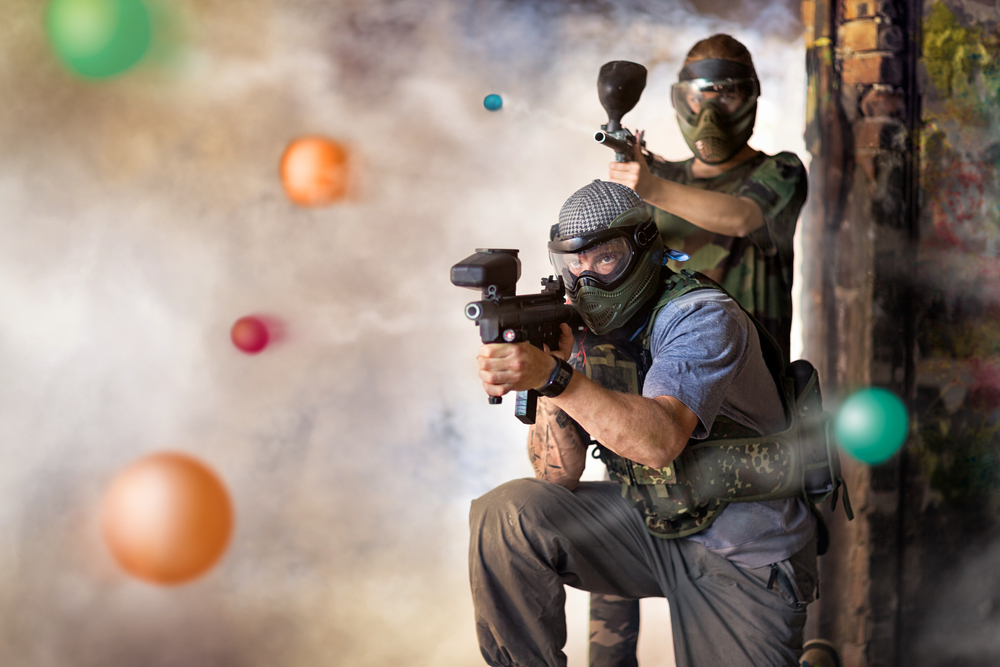Splat! Paintball Blow Causes Liver Damage in Teen

A game of paintball had an unfortunate ending when a teen in England wound up needing liver surgery after being struck in the abdomen, according to a new report of the young man's case.
The injury was the first instance of a person suffering liver damage from playing paintball, the doctors who treated the teen wrote in their report of his case, published May 5 in the journal BMJ Case Reports.
The 18-year-old went to the emergency room in August 2015 because of abdominal pain and a low-grade fever, said Dr. Joshua Luck, a resident surgeon at North Middlesex University Hospital in London, who treated the patient and is the lead author of the case report.
Based on the patient's symptoms, the doctors there diagnosed him with appendicitis. (He hadn't mentioned to the doctors that he had played paintball two days prior.) They scheduled him to have emergency surgery, according to the report. [Costly, Deadly, Complicated: These 7 Surgeries Take the Biggest Toll]
But when the operation began, the doctors were "very surprised to see blood coming from the liver," Luck told Live Science. The doctors even thought that they might have injured a blood vessel during the operation, because the blood in the abdominal cavity was so unexpected, he added. However, they then realized that the problem was the man's liver, not his appendix.
They stopped the bleeding, and after the operation, learned that the man had been playing paintball two days earlier, and had been hit twice in the abdomen, according to the report.
The doctors were surprised to learn that the liver damage most likely resulted from the paintball incident, especially because the man had no bruises on his skin near the liver, Luck said. He noted, however, that it is not uncommon for "seemingly innocuous events to cause internal injuries."
Sign up for the Live Science daily newsletter now
Get the world’s most fascinating discoveries delivered straight to your inbox.
In addition, traumatic injuries can lead to symptoms such as fever, Luck said.
Two days after the man's surgery, the doctors checked to make sure the bleeding had definitely stopped, and the man was allowed to leave the hospital, according to the report.
However, three weeks later, the young man returned. He told the doctors that he had undergone an ultrasound, which showed that there was still blood pooled in the liver, according to the report.
This worried the doctors — they thought the teen might have reinjured his liver, or that the original injury was still bleeding, Luck said. However, further testing showed that no further damage had occurred, and indeed, the body was slowing reabsorbing the pooled blood, he said. In addition, the man's liver was functioning well, he said.
"In the vast majority of blunt liver injuries, the body is able to heal itself over a period of weeks to months without the need for further" medical assistance, Luck said. But sometimes, the healing may be slower than expected, he added.
And in some cases, slow healing of this type of injury may be due to a blood disorder that causes the blood to not coagulate normally, Luck said. However, doctors who specialize in blood disorders confirmed that this was not the case for this man, he said. [7 Strange Ways Humans Act Like Vampires]
While the young man's injury was the first instance of liver damage from paintball, it's far from the first injury from the activity — eye injuries, for example, are common. It is, however, only the fourth case of organ damage from paintball, the authors wrote. There has been one previous case of kidney damage from paintball, and two cases that involved damage to the penis or scrotum, according to the report.
Paintball guns can fire the paintballs at velocities of 100 to 300 feet (30 to 90 meters) per second, according to the report.
This was the young man's first time playing paintball, Luck said. "Whether he'll try it again is yet to be decided," he said.
Currently, the young man is doing well and continuing with his college studies, Luck said.
Follow Sara G. Miller on Twitter @saragmiller. Follow Live Science @livescience, Facebook & Google+. Originally published on Live Science.










